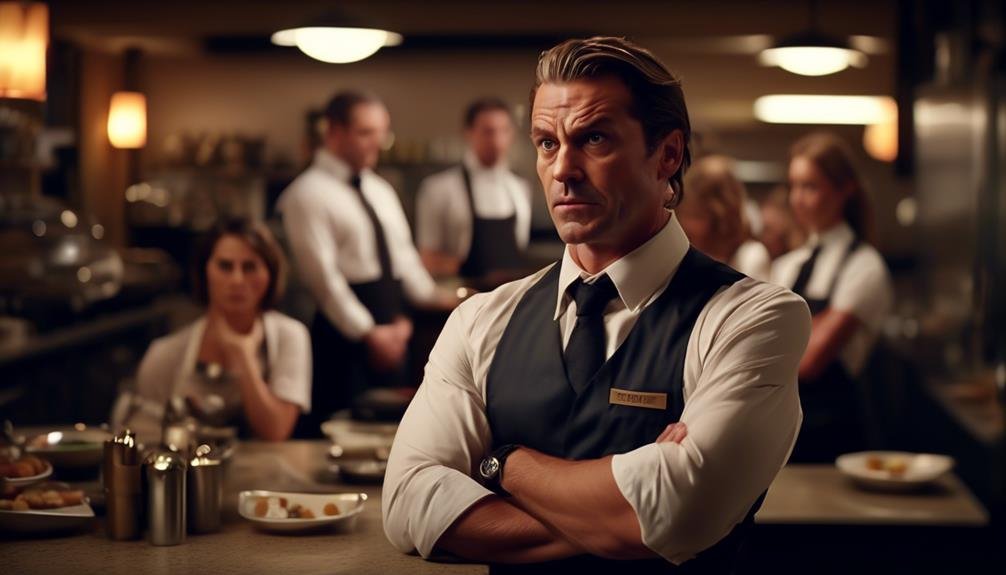Restaurant Management Skills in the Hospitality Industry
When it comes to running a successful restaurant, it's essential to have a firm grasp on restaurant management skills.
From the ability to lead a team to effectively communicate with both staff and customers, these skills are crucial in the fast-paced and dynamic environment of the hospitality industry.
Whether it's ensuring smooth operations or providing an exceptional dining experience, the mastery of these skills can make or break the success of a restaurant.
Key Takeaways
- Cultivate strong leadership skills
- Efficient staff scheduling
- Staff training to deliver exceptional experiences
- Attention to detail and understanding customer needs and preferences
Leadership Skills
To effectively manage a restaurant, you must cultivate strong leadership skills to guide and motivate your team towards success. Team motivation is essential for creating a positive and productive work environment in the restaurant industry. As a leader, your ability to inspire and encourage your team members is crucial for their overall performance. Recognizing and acknowledging their hard work, providing constructive feedback, and fostering a sense of teamwork are fundamental aspects of team motivation.
Decision making is another critical component of effective leadership in restaurant management. You'll often be required to make swift and well-informed decisions, ranging from addressing customer complaints to managing inventory and personnel. Your ability to make sound judgments under pressure and with limited information can greatly impact the success of your restaurant. Moreover, involving your team in the decision-making process can enhance their sense of ownership and commitment to the restaurant's goals.
Communication Abilities
Cultivating strong communication abilities is essential for effectively leading and motivating your restaurant team towards success. As a manager in the hospitality industry, active listening is crucial for understanding your team's needs and concerns. By actively listening to your employees, you create an atmosphere of trust and respect, which can lead to increased job satisfaction and productivity.
Additionally, conflict resolution is a vital skill in managing a restaurant team. Being able to mediate and resolve disputes in a professional and fair manner fosters a positive work environment and minimizes disruptions to the workflow.
Verbal and nonverbal communication are equally important in the hospitality industry. Your verbal communication should be clear, concise, and encouraging, providing guidance and feedback to your team. Nonverbal cues also play a significant role in conveying your message. Your body language, facial expressions, and tone of voice can impact how your messages are received by your employees. Being mindful of these nonverbal cues can help you convey confidence and approachability, which are essential for effective leadership.
Mastering these communication abilities won't only enhance your leadership skills but also contribute to the overall success of your restaurant team.
Problem-Solving Competencies

As a restaurant manager, you must demonstrate strong problem-solving competencies to effectively address challenges and ensure smooth operations within your establishment. Critical thinking plays a vital role in your ability to analyze situations, identify potential issues, and develop innovative solutions.
Whether it's dealing with a sudden staff shortage, resolving customer complaints, or optimizing processes to enhance efficiency, your critical thinking skills will be essential. Being able to make timely and well-considered decisions is equally crucial in the fast-paced environment of a restaurant. You'll often encounter situations that demand swift and effective decision-making, such as adjusting inventory orders based on demand fluctuations or handling unexpected equipment malfunctions.
Your decision-making abilities will directly impact the overall performance and success of your restaurant. By honing your problem-solving competencies, you can proactively tackle challenges, minimize disruptions, and elevate the dining experience for both customers and staff.
Operational Understanding
Developing a deep understanding of the operational intricacies of your restaurant is essential for effective management and success. Two critical aspects of operational understanding in restaurant management are staff scheduling and inventory management. Efficient staff scheduling ensures that the right number of employees with the required skills are available during peak hours, minimizing labor costs while maintaining excellent customer service. On the other hand, effective inventory management guarantees that the restaurant has the necessary ingredients and supplies to meet customer demand without excess stock leading to waste.
| Staff Scheduling | Inventory Management |
|---|---|
| Optimize labor costs | Track inventory levels |
| Match staff skills to demand | Prevent overstocking and waste |
| Minimize understaffing | Establish par levels for ingredients |
| Use scheduling software | Implement FIFO method for stock |
Understanding the nuances of staff scheduling and inventory management empowers you to streamline operations, reduce costs, and enhance the overall customer experience. By mastering these operational aspects, you can create a well-oiled machine that runs smoothly and efficiently, ultimately contributing to the success of your restaurant.
Customer Experience Management

Mastering staff scheduling and inventory management is pivotal for creating a seamless and efficient operation, setting the stage for exceptional customer experience management in your restaurant.
Service standards play a crucial role in ensuring that every guest receives the same high-quality experience. Consistency in service is key to meeting and exceeding customer expectations. Staff training is essential for instilling these service standards and ensuring that every team member understands the importance of delivering exceptional customer experiences.
Feedback analysis is another critical aspect of customer experience management. Regularly collecting and analyzing feedback from guests can provide valuable insights into areas that require improvement and highlight what's already working well. This allows for the implementation of targeted strategies to enhance overall guest satisfaction.
Ultimately, customer experience management is about creating an environment where guests feel valued and well-cared for. It requires attention to detail, a commitment to continuous improvement, and a deep understanding of the needs and preferences of your customer base.
Conclusion
In the fast-paced world of restaurant management, honing your leadership, communication, problem-solving, operational, and customer experience skills is essential.
Embrace the challenges, continuously improve, and strive for excellence.
After all, in the hospitality industry, success isn't just about serving great food; it's about creating memorable experiences for your guests.
So, go forth and lead with passion, communicate with clarity, innovate with creativity, and always prioritize the guest experience.
Your journey to success starts now.





